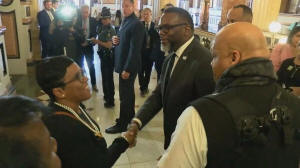Supporters, critics react to Chicago's mayor lobbying state legislators
 Send a link to a friend
Send a link to a friend
 [May 14, 2024]
By Catrina Petersen | The Center Square [May 14, 2024]
By Catrina Petersen | The Center Square
(The Center Square) – Despite 12 consecutive years of decreased
enrollment at Chicago Public Schools, Mayor Brandon Johnson is looking
for more state taxpayer money. Some are questioning Johnson's insistence
that enrollment is "stabilizing."
Hal Woods, Kids First Chicago chief of policy, said CPS experienced an
enrollment increase this year because of the migrant children enrolling
at CPS.
“This question of stability is interesting. We can see from CPS’s own
data that really the reason why CPS’ enrollment is up is because of
newcomers, migrants and asylum seekers,” said Woods. “CPS’s kindergarten
enrollment went down this year. What you saw is that [increased]
enrollment happened at all different grade levels, that’s because people
were coming from Latin America and other places and they were enrolling
their kids once they got to Chicago."
Johnson has issued shelter evictions but migrants who enroll their
children in CPS get to stay longer, Woods said. Chicago has been
experiencing a migrant crisis where busloads of migrants from the
southern U.S. border are regularly dropped off in the city.

"But we have no idea if [migrant] families are going to be staying at
CPS beyond this current school year,” said Woods.
Birth rates are a contributing factor to enrollment declining at CPS, he
said.
“Why has Chicago Public School enrollment declined? It’s a reduction of
school-aged children,” said Woods. “We had about 43,000 babies being
born in 2009, and we’re at 28,000 in 2021. We continue to see a decline
in the number of Black students enrolled in CPS. CPS enrollment data
shows a -1.8% decline (about 2,100 students) from last school year to
this school year.”
More recently, CPS estimates that between 9,000 and 17,000 migrant
students have enrolled since August 2022.
State Rep. Dan Caulkins, R-Decatur, attributed CPS’s declining
enrollment to the outmigration crisis the state is facing.
“Their [CPS] enrollment is declining because the population in Cook
County is declining because of the crime, the bad schools and the lack
of opportunity. Businesses are leaving,” said Caulkins. "Office
occupancy is down in Chicago. People are practically giving property
away in Chicago to get out from under the property tax burden. Chicago
is imploding."
[to top of second column]
|

Chicago Mayor Brandon Johnson in Springfield
BlueRoomStream

Caulkins said that CPS shouldn’t be getting more money considering their
woeful proficiency rates in reading and math.
“Johnson was here asking for $100 million+ and the Chicago Public
Schools have asked for $50 billion. They are asking for $50 billion from
the state of Illinois to prop up the school district in Chicago,” said
Caulkins. "I don’t think the people in our districts really care to do
that, not when students can’t meet reading and math proficiencies."
The Chicago Teachers Union is negotiating a new contract with CPS and
CTU is reportedly calling for an extra $50 billion to pay for wage hikes
as well as fully paid abortions for its members and new migrant services
and facilities.
Gov. J.B. Pritzker recently released a memo detailing how there’s an
$800 million revenue shortfall in the 2025 budget. Lawmakers in the
Freedom Caucus suggested the governor stop spending on education for
illegal immigrants and to "cut the pork" out of the budget. Pritzker
warned state agencies they will have to prioritize spending.
Woods explained the state needs to provide adequate funding to meet the
students' needs. The organization endorsed evidence-based funding when
then-Gov. Bruce Rauner signed it into law. Woods said when the state
government approved EBF, they made a commitment to fully fund all
districts by 2027. Right now, Woods said $1.1 billion is needed to
address underfunded CPS.
“I think what the mayor and CPS has been saying is, ‘look, we are losing
COVID-relief dollars and we’re a chronically underfunded school district
… and there’s not a lot of places where CPS can eliminate its budget
deficit,’" said Woods. "A lot of money is in people and a lot of money
is in people who are based at schools, and rather than having to go
through school cuts … can we accelerate the pace of funding from the
state to be able to ensure we don’t have to make tough decisions at the
school level?”
CPS’s per-pupil operational spending is $24,132, up more than 50% from
$15,878 in 2018, according to the Illinois State Board of Elections.
 |